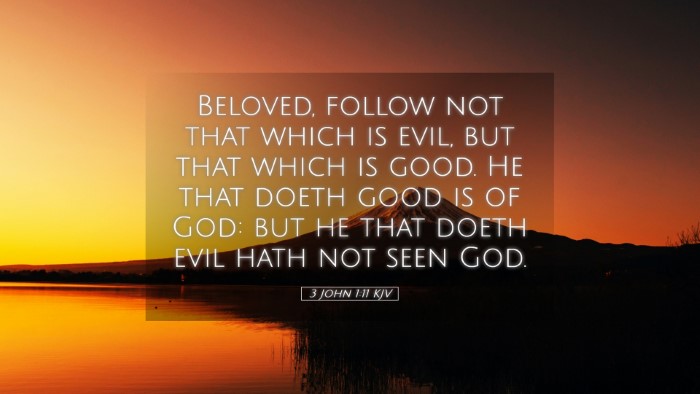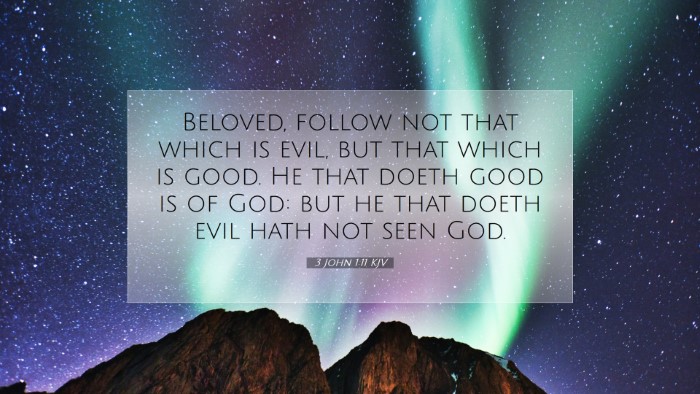Commentary on 3 John 1:11
Verse: "Beloved, follow not that which is evil, but that which is good. He that doeth good is of God: but he that doeth evil hath not seen God."
Introduction
The Apostle John's third epistle provides profound insights into the nature of leadership in the church and the moral responsibilities of individuals within the Christian community. In this singular verse, John contrasts good and evil, providing a moral imperative to the believers. This commentary synthesizes insights from key public domain commentaries to explore the theological and practical applications of this verse.
The Call to Righteousness
John's exhortation begins with the term "Beloved," establishing a tone of affectionate concern. This term emphasizes not just friendship but a familial bond within the Christian community. The moral directive to "follow not that which is evil, but that which is good" presents an imperative that is critical for believers. This duality is significant, highlighting the necessity for believers to actively choose good over evil.
- Matthew Henry: Emphasizes that the instruction is not merely a passive avoidance of evil but an active pursuit of good. Believers are called not only to abstain from wrongdoing but also to engage in righteous deeds.
- Albert Barnes: Notes the universal applicability of this directive, suggesting that the moral choice presented here is intrinsic to the Christian faith and speaks to the nature of true discipleship. The directive serves as a litmus test for the authenticity of one's belief.
- Adam Clarke: Highlights the implications of each choice. To follow good is synonymous with following Christ, since Christ embodies goodness itself. Conversely, to follow evil stands in stark opposition to the nature of God.
The Nature of Good and Evil
Understanding what constitutes good and evil necessitates a biblical worldview. In the context of this verse, good is associated with the character and actions of God, while evil represents a deviation from divine standards.
- Matthew Henry: Suggests that the acts of goodness are reflective of one's relationship with God; the good deeds flow from the transformative power of faith. This reflects a person's moral alignment with God's will.
- Albert Barnes: Points out that John connects the knowledge of God to the distinction between good and evil—those who do good align themselves with God's nature, while those who do evil demonstrate ignorance of God.
- Adam Clarke: Discusses the implications of recognition of God, arguing that true believers not only know about God but have truly encountered His presence and nature, which consequently influences their moral choices.
The Importance of Actions
The latter part of the verse affirms "He that doeth good is of God: but he that doeth evil hath not seen God." This statement serves as a theological affirmation of the believer’s identity, as actions are the fruit of faith.
- Matthew Henry: Highlights the transformative effect of faith: genuine encounters with God result in a lifestyle defined by good works, serving as evidence of salvation.
- Albert Barnes: Notes the stark contrast between those identified with God and those who neglect moral integrity. This division emphasizes the credibility of one's faith in relation to one's actions.
- Adam Clarke: Suggests that this duality—of knowing God and doing good—is crucial for understanding the essence of Christian living. A life lived apart from good is indicative of a life that has not genuinely known God.
Application in the Christian Community
The implications of this verse extend beyond personal conduct; they speak to how believers are to interact within their communities. As such, the Christian community must be vigilant, encouraging one another toward good and providing admonition against evil.
- Matthew Henry: Encourages the church to exemplify goodness through its collective actions, thereby creating an environment that fosters growth and holiness among its members.
- Albert Barnes: Emphasizes the role of the church in upholding truth and righteousness, noting that the neglect of moral responsibility can lead to a loss of influence and integrity.
- Adam Clarke: Calls believers to discernment in leadership, urging them to support those who promote good and to be wary of those who propagate evil within the community.
Conclusion
3 John 1:11 serves as a clarion call to the Christian community, beckoning believers to choose good actively and to shun evil. The insights from Matthew Henry, Albert Barnes, and Adam Clarke offer a multifaceted understanding of this biblical imperative, bridging the theological significance of knowledge of God with practical moral living. In an age where moral relativism often challenges scriptural truths, this verse stands timeless, reminding the faithful of their identity in Christ and the righteous path they are called to walk.


